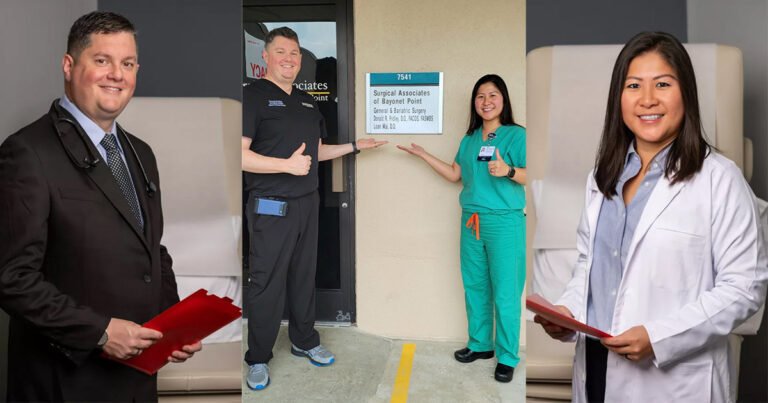- Now 2 Locations to Choose From!
- (727) 819-9107
- sabp@tampabaysurgicalgroup.com
Hiatal Hernia Repairs and Reconstructive Surgeries

Dr. Donald Fridley and Dr. Loan Mai specialize in complicated hiatal hernia repairs and reconstructive surgeries in the Greater Tampa Bay, FL area.
A hiatal hernia occurs when a part of the stomach (usually or other organs, less commonly) pushes up through your diaphragm into your chest cavity. The diaphragm is a muscle that separates the abdomen from the chest, and the opening in it (called the hiatus) allows the esophagus to pass through. When a hiatal hernia forms, part of the stomach can slip through this opening, often leading to complications.
There are two main types of hiatal hernias:
- Sliding Hiatal Hernia: This is the most common type, where the stomach and the part of the esophagus that joins the stomach slide up into the chest.
- Paraesophageal Hiatal Hernia: In this less common but more serious form, part of the stomach pushes through the diaphragm and stays next to the esophagus, which can lead to more serious complications.
If you’re experiencing severe symptoms, especially chest pain, difficulty swallowing, or vomiting, it’s important to consult with a healthcare provider for further evaluation.
If left untreated or unaddressed, the consequences can vary depending on the size and severity of the hernia. Here are some potential complications that may arise if a hiatal hernia isn’t repaired or managed properly:
- Gastroesophageal Reflux Disease (GERD): One of the most common issues caused by a hiatal hernia is acid reflux. The hernia can weaken the lower esophageal sphincter (LES), leading to stomach acid backing up into the esophagus. This can cause heartburn, chest pain, difficulty swallowing, and a persistent cough.
- Esophagitis or Esophageal Ulcers: The acid from GERD can damage the lining of the esophagus, leading to inflammation (esophagitis) or even the formation of ulcers. Over time, this can lead to scarring and narrowing of the esophagus, which may make swallowing more difficult.
- Strangulation of the Hernia: In rare cases, part of the stomach can become trapped or “strangulated” in the hernia. This can cut off the blood supply to the trapped part of the stomach, which can cause severe pain, nausea, vomiting, and may require emergency surgery.
- Bleeding: A hernia can cause irritation or damage to the stomach or esophagus, leading to bleeding ulcers. This could result in vomiting blood or passing black, tarry stools, which may indicate gastrointestinal bleeding.
- Barrett’s Esophagus: Chronic acid reflux caused by a hiatal hernia can increase the risk of Barrett’s esophagus, a condition where the lining of the esophagus changes and can eventually lead to esophageal cancer in some cases.
- Breathing Issues: If the hernia is large enough, it could potentially interfere with the normal function of the lungs and diaphragm, leading to difficulty breathing or a sensation of shortness of breath, especially when lying down.
- Pain and Discomfort: Many people with a hiatal hernia experience chronic chest pain or discomfort, which can worsen over time if the condition isn’t addressed. This pain is often mistaken for a heart attack but is usually related to GERD or irritation of the hernia.
It’s important to follow up with a healthcare provider if you suspect you have a hiatal hernia to manage the symptoms and prevent these complications. Treatment options can range from lifestyle changes and medications to surgical interventions if necessary.
If a hiatal hernia is not repaired properly, or if the repair does not fully address the underlying issue, it can lead to several complications:
- Recurrence of Symptoms: If the surgery doesn’t adequately repair the hernia, symptoms like acid reflux, heartburn, chest pain, and difficulty swallowing may persist or return. The hernia can “slip” back through the diaphragm or the lower esophageal sphincter (LES) may remain weak, continuing to allow stomach acid to reflux into the esophagus.
- Strangulation and Necrosis: If the hernia is not fully repaired and part of the stomach or other tissues remain trapped, this can lead to strangulation, where the blood supply to the trapped tissue is cut off. This is a medical emergency and can result in tissue death (necrosis), causing severe pain, nausea, vomiting, and potentially life-threatening consequences requiring immediate surgery.
- Esophageal Damage: If the hernia isn’t properly repaired, the long-term acid reflux may continue to damage the esophagus, leading to chronic inflammation, ulcers, narrowing of the esophagus (stricture), or the development of Barrett’s esophagus, which increases the risk of esophageal cancer.
- Increased Risk of Complications: Incomplete repair can leave the patient at higher risk for complications like bleeding, chronic pain, or respiratory problems. The hernia may continue to worsen over time, leading to more significant issues and possibly requiring more extensive future surgery.
- Inability to Properly Breathe or Digest: If the hernia is not repaired correctly, it can potentially cause pressure on the diaphragm or lungs, leading to difficulty breathing, especially when lying down. The stomach may also have difficulty moving food properly into the small intestine, leading to indigestion or bloating.
To avoid these risks, it is essential that a hiatal hernia is repaired by an experienced surgeon, and follow-up care is monitored to ensure the surgery was successful and that the hernia does not recur or cause additional complications.
Luckily, Surgical Associates of Bayonet Point (SABP) offers two highly skilled surgeons, both robotically trained under one roof with over 25 years of experience combined. Dr. Donald Fridley and Dr. Loan Mai specialize in complicated hiatal hernia repairs and reconstructive surgeries. Both surgeons take pride in their high accolades for great bedside manner and surgical skill level. Dr. Fridley and Dr. Mai are Pennsylvania College of Osteopathic Medicine (PCOM) alumni and are currently practicing in West Pasco County located north of the beautiful Tampa Bay, Florida.

